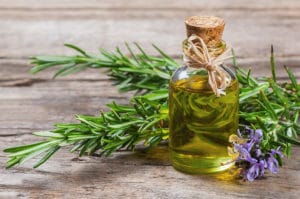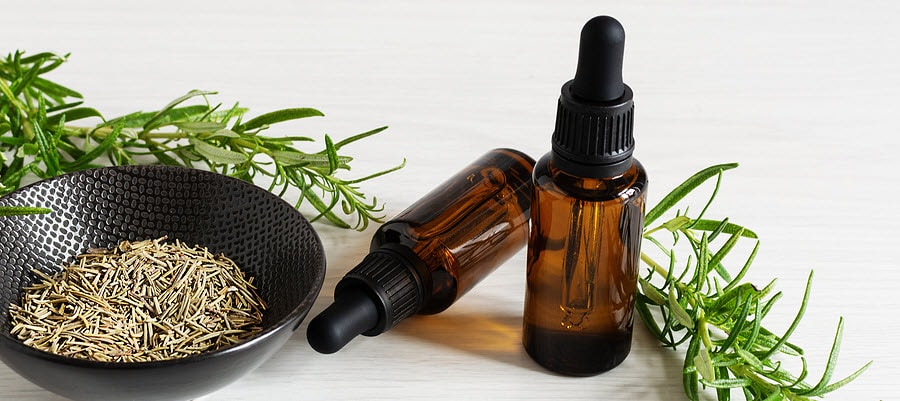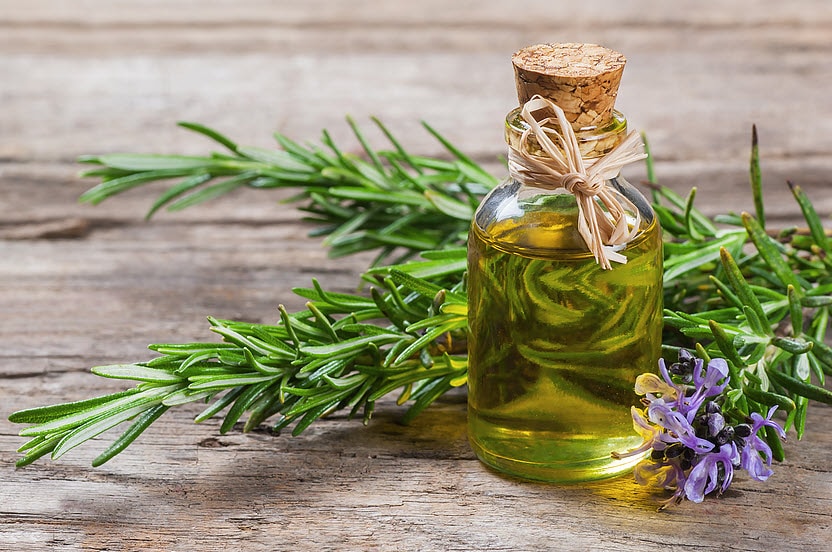Table of Contents
Rosemary (Rosmarinus officinalis) is an evergreen herb belonging to the mint family Lamiaceae. And is used world-wide as a culinary spice and medicine.
Native to the Mediterranean region, Rosemary is now grown around the world. It has traditionally been used as a nootropic to treat memory loss.
And for high blood pressure, headaches, insomnia, and respiratory system-related diseases.
Rosemary is considered a powerful cardiac stimulant, a strong antiseptic, antispasmodic, calms the nerves, for arthritis, dandruff, skin diseases, and stimulate hair growth.[i]
Here we’ll investigate Rosemary’s value as a nootropic and to optimize cognition.
Rosemary helps:
- Memory: Rosemary helps improve memory, boosts alertness, energy, and focus. And acts as a cognitive stimulant, improving concentration, cognitive performance and speed, and accuracy.
- Antioxidant and anti-inflammatory: As a rich source of antioxidants and anti-inflammatory compounds, Rosemary boosts the immune system and improves blood circulation. Antioxidants play a vital role in neutralizing free radicals.
- Alzheimer’s: The compounds found in Rosemary including diterpenes, carnosic acid, and carnosol have been shown in recent studies to inhibit acetylcholinesterase (AChE) activity, is a heavy metal chelator, and protects against Amyloid-β aggregation and tau tangles.[ii] All promising therapies for preventing Alzheimer’s Disease.
Overview
Rosemary (Rosmarinus officinalis) is a fragrant herb with needle-shaped leaves native to northern Asia and the Mediterranean.
 Rosemary’s medicinal use dates back to the ancient Greeks and Romans in 500 B.C. Greek students wore garlands of Rosemary on their head to help stimulate memory during exams.
Rosemary’s medicinal use dates back to the ancient Greeks and Romans in 500 B.C. Greek students wore garlands of Rosemary on their head to help stimulate memory during exams.
Its genus name, Rosmarinus, is derived from the Latin word for ‘dew’ (ros), and ‘belonging in the sea’ (marinus).
Legend says the Virgin Mary took shelter next to a Rosemary bush as she fled from Egypt. She threw her blue cape on a Rosemary bush, and the white flowers turned blue. This is how Rosemary or ‘rose of Mary’ got its name.[iii]
Rosemary with its pleasant flavor and aroma, and bitter taste is used in many traditional dishes. Rosemary can be used in the form of fresh leaves, powder, or as an essential oil.
Rosemary has also been used traditionally to relieve pain, improve memory, increase immunity, and promote hair growth.
Rosemary is an excellent source of calcium, iron, and Vitamin A, Vitamin B6, and Vitamin C. And provides potent antifungal and antibacterial properties.[iv]
Compounds found in Rosemary oil have been shown to increase memory. The compound 1,8-cineole acts as an acetylcholinesterase inhibitor which boosts acetylcholine levels in your brain. In the same way as drugs prescribed to treat dementia.[v]
A study conducted at Mahidol University in Thailand in 2013 tested Rosemary essential oil and its effects on the human central nervous system.
20 healthy subjects ages 18 – 28 years were asked to inhale the aroma of Rosemary essential oil. An EEG found that alpha brain waves decreased, and beta brain waves increased after inhalation of the oil.
This change in brain wave activity boosted alertness and improved thinking performance. The study confirmed the stimulant effects of inhaling the aroma of Rosemary essential oil.[vi]
Rosemary essential oil is also a proven stress-reliever. It acts by lowering cortisol levels.
Research shows that Rosemary has stimulatory effects on brain wave activity, autonomic nervous system activity, and mood.
 How does Rosemary work in the brain?
How does Rosemary work in the brain?
Rosemary boosts brain health and function in several ways. But two in particular stand out.
- Rosemary improves memory – Rosemary has traditionally been used to improve cognitive performance and mood. And these reports have been verified in recent clinical studies.
A study conducted at the University of Northumbria in the UK worked with 144 volunteers. In this study, the group who inhaled Rosemary essential oil demonstrated an overall improvement in memory and mood.[vii]
In 2013, Jemma McCready and Dr Mark Moss from the University of Northumbria conducted a study with 66 adults. The focus of this trial was on prospective memory, which involved remembering things that were bound to happen in the future, or simply remembering things that were critical for everyday functioning.
The test group were put into a room infused with Rosemary essential oil, and the control group in a room with no scent.
The study found that the group in the Rosemary scented room performed 60-75% better on the prospective memory tasks than the control group.[viii]
In 2017, the same researchers presented their findings to the British Psychological Society Annual Conference in Brighton.
In a follow-up study, they recruited 40 children age 10 – 11 to find out if Rosemary produced a similar benefit in the young.
Once again, the test group were put into a Rosemary oil infused room, and the control group in a room with no scent.
The researchers found that children in the Rosemary scented room performed 5 to 7% better in working memory scores than the kids in the control group.[ix]
- Rosemary is neuroprotective – Rosemary’s bioactive compounds including phenolic diterpenes and triterpene acids are known to be potent neuroprotectors.
Animal research demonstrates the phenolic compounds in Rosemary reduce oxidative stress. Animals pre-treated with Rosemary experienced far less brain damage during an ischemic stroke. And recovered with higher neurological scores because of an intact blood-brain barrier.[x]
Rosemary extract has been used traditionally and in modern times to relieve pain. Studies show that terpenoids, and to a lesser extent rosmarinic acid significantly reduce pain sensitivity.
Rosemary protects nerve fibers and prevents reduction in both myelin thickness and axon diameter. And helps maintain the plasticity of glial cells and astrocytes involved in pain maintenance. In turn preventing feelings of pain and alterations of the nervous system induced by nerve injury.[xi]
Its anti-neuropathic properties can be attributed to rosemary binding to nicotinic acetylcholine receptors which are polypeptides that respond to the neurotransmitter acetylcholine. When rosemary binds to these receptors it reduces neuropathic hypersensitivity and protects nerve tissue.[xii]
How things go bad
As we get older, our brain chemistry and energy metabolism changes.
↓ Concentration, attention, and mental agility decline
↓ Brain cell membranes degenerate
↓ Acetylcholine levels decline
↓ Free radicals and oxidative stress damage brain cells
All of these age-related changes are contributing factors to the neurodegenerative diseases of aging, including Alzheimer’s and dementia.
But even if you’re not concerned with the effects of aging, Rosemary can help.
 Rosemary Benefits
Rosemary Benefits
Rosemary has been used for millennia to protect and support brain function.
Rosemary is a potent anti-inflammatory and antioxidant.
Rosemary can boost concentration and memory. Simply smelling Rosemary can help you remember things better.
20 healthy volunteers performed subtraction and visual processing tasks in a cubicle diffused with the aroma of Rosemary. Mood was assessed before and after the test. And blood samples were taken during the study.
The study showed improved performance and concentration related to how much 1,8-cineole was absorbed following exposure to Rosemary aroma.
Speed and accuracy improved and there was a significant reduction in feelings of contentment as blood levels of 1,8-cineole declined.[xiii]
Reductions in acetylcholine is implicated in neurodegenerative diseases such as Alzheimer’s and dementia. Rosemary inhibits acetylcholinesterase activity which increases acetylcholine levels in the brain.
Amyloid-β proteins clump to form amyloid plaques and neurofibrillary tangles (NFT) causing memory loss in Alzheimer’s and dementia. The carnosic acid in Rosemary has been shown to suppress the formation of amyloid-β plaques.[xiv]
Additional nootropic benefits from consuming or inhaling Rosemary, include enhanced cognitive performance, elevated alertness, and less anxiety.[xv]
How does Rosemary feel?
 Many users of Rosemary report more energy and better clarity when thinking after taking the supplement.
Many users of Rosemary report more energy and better clarity when thinking after taking the supplement.
When used as a nootropic, Rosemary works as a cognitive stimulant and helps improve memory, alertness, and focus.
People who use Rosemary essential oil report improved mood, lower stress levels, and fewer episodes of cortisol imbalance.
Some report better immunity and blood circulation after supplementing with Rosemary. Likely due to its rich antioxidant and anti-inflammatory properties.
Some neurohackers also like to include Rosemary in their diets as an herbal tea, or as a seasoning agent in food. It has a lovely flavour and aroma that can energize you instantly.
Rosemary Clinical Research
Rosemary boosts cognitive performance
Researchers at Northumbria University, Newcastle upon Tyne wanted to find out how the aroma of essential oils affected human behavior.
 In this study, 20 healthy volunteers performed serial subtraction and visual information processing tasks in a cubicle infused with 4 drops of Rosemary essential oil.
In this study, 20 healthy volunteers performed serial subtraction and visual information processing tasks in a cubicle infused with 4 drops of Rosemary essential oil.
Mood was assessed pre- and post-testing, and blood samples were drawn at the end of the session.
The study authors discovered that performance on cognitive tasks were related to the concentration of 1,8-cineole from Rosemary absorbed in blood from simple exposure to Rosemary aroma.
Performance improved as concentrations of 1,8-cineole increased. This performance boost was reflected in speed and accuracy.
Mood changes were not as significant. But the researchers did notice that feelings of contentment declined as 1,8-cineole levels in blood decreased.
The researchers concluded that compounds absorbed from Rosemary aroma had a positive effect on cognition and mood.[xvi]
Rosemary increases alertness
A study at the University of Miami School of Medicine recruited 40 adults to observe the effects of aromatherapy on alertness and mood.
Participants were exposed to the aromas of Lavender (considered a relaxing odor) or Rosemary (considered a stimulatory odor) for 3 minutes each.
Participants were also given simple math computations before and after the therapy.
The Lavender group showed increased beta power suggesting increased drowsiness, and less depression. The adults in this group also reported feeling more relaxed and performed the math computations faster and more accurately following aromatherapy.
The Rosemary group on the other hand showed decreased frontal alpha and beta power suggesting increased alertness.
 The Rosemary adults also had lower anxiety scores. They reported feeling more relaxed and alert. They were faster doing math computations but unlike the Lavender group were not more accurate.[xvii]
The Rosemary adults also had lower anxiety scores. They reported feeling more relaxed and alert. They were faster doing math computations but unlike the Lavender group were not more accurate.[xvii]
Rosemary Recommended Dosage
The recommended dosage of Rosemary leaf for nootropic benefit is 750 mg per day.
Rosemary extract (standardized to 20% rosmarinic acid, 20% diterpenes, and 9% carnosic acid) is 275 mg per day.
Rosemary essential oil in a diffuser 1 mL (10 – 40 drops) as needed.
Rosemary Side effects
Rosemary as a nootropic is considered non-toxic and safe when used as recommended.
Rosemary as been used by humanity for millennia as a food condiment. So as a nootropic should be well tolerated by most people.
Rosemary has been shown in animal models to reduce sperm count in male rats, and abort fetuses in female rats.
But keep in mind that the dosage size of Rosemary in rats was 250 and 500 mg/kg of body weight. Much higher doses than we would use as a nootropic. Authors of this study attributed these side effects to reductions in testosterone caused by high-dose Rosemary.[xviii]
Do no use Rosemary if you are using blood-thinning medication. Or ACE inhibitors used to treat high blood pressure.
Do NOT take Rosemary essential oil internally because it could cause vomiting, uterine bleeding, kidney irritation, increased sun sensitivity, skin redness, and allergic reactions.
Do not use Rosemary as a nootropic supplement if you are pregnant because it may stimulate a miscarriage. And if you’re breastfeeding you should use Rosemary in moderation.
If you are diabetic, pre-diabetic or suffer from insulin resistance you should avoid using Rosemary as a nootropic.[xix]
Avoid using Rosemary if you are undergoing chemotherapy.
Type of Rosemary to Buy
Rosemary is available as a nootropic supplement in capsules, tablets, and as bags of powder.
As an extract, look for Rosemary standardized to 20% rosmarinic acid, 20% diterpenes, and 10% carnosic acid.
Rosemary essential oil can be used in aromatherapy or for topical application on your skin.
Nootropics Expert® Recommendation
 Rosemary extract up to 750 mg per day.
Rosemary extract up to 750 mg per day.
I recommend using Rosemary extract as a nootropic supplement. Either in capsule form or as aromatherapy.
Your body does not make Rosemary on its own. So, to get its benefits you must take it as a supplement or use it in aromatherapy.
Rosemary as a nootropic can be taken as a supplement in capsules or powder or steeped as Rosemary tea 2 or 3-times a day.
Rosemary seems to be especially helpful for those dealing with Alzheimer’s and other neurodegenerative diseases. Rosemary increases acetylcholine, inhibits Amyloid-β plaques and tau tangles, reduces inflammation and eliminates heavy metals.
Rosemary has been shown to help reduce anxiety and improve mood. And works quickly when used as an essential oil in aromatherapy.
Simply the scent of Rosemary has been proven to boost alertness and memory.
Purity and dosing are important when selecting a Rosemary extract supplement or essential oil. Choose a product where the manufacturer can verify their production and testing methods.
And user reviews can be very helpful for choosing the best vendor and brand of Rosemary.







Join The Discussion - 18 comments
Nina
November 3, 2025
Dear David and friends of this site, I want to mention something that I have been doing for about 3 years now and I feel that it helps my thinking. I have rosemary in a pot, I cut a few sprigs, wash them, dry them well and chop them. I put them in a dark glass jar with MCT oil. I leave them for a month and then strain them and put them in a glass measuring cup. Every time I drink coffee (morning-afternoon) I add about 10 drops to my coffee and put 2-3 drops on the inside of my wrist. I like that I make it myself and I feel that it helps me. I think it is easy for anyone to make.
PHILIP ODZOR
January 28, 2025
“Do NOT take Rosemary essential oil internally because it could cause vomiting, uterine bleeding, kidney irritation, increased sun sensitivity, skin redness, and allergic reactions.”
David , can you please explain further, I take 1ml of rosemary essential oil a day , if it not to be taken internally as a nootropic ,how do I use it?
David Tomen
January 29, 2025
Philip, Rosemary essential oil is used for aromatherapy or for topical application on your skin. It was never meant to be used internally. Essential oils often have other ingredients in them that is not meant to be in the human body. If you are going to supplement with Rosemary then get a capsule supplement. Or a tea.
Philip
January 31, 2025
Thank you David for the reply, I have one question, I’m currently taking Amitriptyline 25mg for depression
It giving me some nasty side effects so I want to stop and take L-tryptophan and L-trysosine instead since you said they are the safest and natural way to boost serotonin naturally in the brain
I’m also taking Lion’s mane, Bacopa , Ashwaganda, Gotu Kola , Gingko , Turmeric and black pepper on a daily basis
I don’t like the idea of taking antidepressants
David Tomen
January 31, 2025
Philip Tryptophan will increase your serotonin levels. And Tyrosine will increase your dopamine and norepinephrine levels. And use a good BioActive B-Complex along with magnesium and Vitamin D3 which act as cofactors in the production of those neurotransmitters.
Robert Scott Sessoms
March 4, 2024
HiYa. Is Rosemary safe with Lithium Orotate. Healthline article said R acts as a diuretic and can’t be combined with Lithium. (Would this also apply to the smaller 15mg/day of Lithium Orotate version?). Thank you – Scott
David Tomen
March 9, 2024
Robert, I would not put much faith in what you read on Healthline. Because the writers they hire to write those articles have no where near the thousands of hours of research and writing that goes into my stuff. That said, I’ve not seen anything to suggest Lithium Orotate is contraindicated with Rosemary.
VINEVIDA
September 24, 2023
This article provides an invaluable resource for those seeking to harness the holistic advantages of Rosemary essential oil. A must-read for enthusiasts of natural health solutions.
James
January 12, 2023
Hey David,
Just wondering if the kind of Rosemary Leaves that come in a jar in the condiments section of a grocery store would have the nootropic benefits you describe in this article or if they’re a different thing entirely (e.g. like how Holy Basil is the nootropic whereas the condiment Basil is not a nootropic)?
Thanks 🙂
David Tomen
January 13, 2023
James, Rosemary used in supplements is usually an extract. You’ll get nootropic benefits from Rosemary leaves as well but not nearly as effective as the extract.
Steven
January 10, 2022
What do you mean it’s a cardiac stimulant? As in increases heart rate?
I would imagine it may reduce heart rate because of its anti anxiety effects.
David Tomen
January 11, 2022
Steven, it is primarily anecdotal evidence but some forms of Rosemary provide stimulant qualities. Here is one example: https://pubmed.ncbi.nlm.nih.gov/23833718/
Anthony
March 21, 2021
Hello David,
Which Rosemary product do you recommend?
I want to purchase a great product.
Can you send a Link for what you take?
Thanks
David Tomen
March 23, 2021
Anthony, this one is the only extract I can find that contains 20% rosmarinic acid: https://amzn.to/3tP2hk0
Craig
December 31, 2022
your Amazon “Rejuvenation Therapeutics Rosemary Extract”
is “Currently unavailable.
We don’t know when or if this item will be back in stock. ”
Any other similar source or suggestions?
Thank You
Craig
David Tomen
January 13, 2023
Craig, your next best option is: https://geni.us/g0dd (Amazon)
David
February 14, 2021
Hi, David. What else can be used for prospective memory improvement besides Rosemary. I purchased rosemary essential oil, and I ordered sage essential oil. I just leave on my diffuser throughout the day. I’ve also been drinking about 3-4 cups of mint tea throughout the day. Do you have any other suggestions? Thanks.
David Tomen
February 15, 2021
David, I do have some other suggestions.
Prospective Memory is a form of short-term memory. You’ll find extensive research on how memory works in your brain here: https://nootropicsexpert.com/best-nootropics-for-learning-and-memory/. Go to the Table of Contents for that article and click on “Short-term memory” if you don’t want to read to entire article.
But I suggest you read the entire article of course. It’s amazing how our brain works to form memory. That 2 lb. organ between your ears is easily the most complex thing in the entire Universe. That article will help you understand how it works.